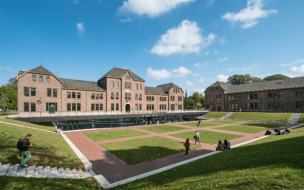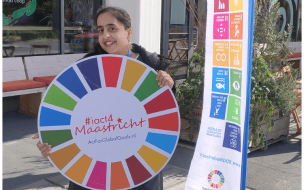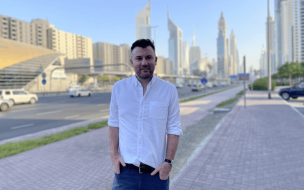Fortunately, programs like the annual MBA Specialization Summer School courses at Maastricht School of Management (MSM) are here to fill that gap.
The two-week, intensive learning experiences that take place in July each year see 110 students from 30 different countries come together, from across the school’s program offering and beyond, to learn new skills from world-class professors and industry experts.
Full-time MBA students rub shoulders with EMBAs and international students from the school’s outreach partners in places like Hungary, Vietnam, and Peru—as well as other businesspeople just looking to expand their skillset.
The specialization topics on offer currently span from traditional, ‘MBA-style’ courses in topics like Entrepreneurship and Accounting and Finance to more unusual offerings—in the Digital Economy, Healthcare Management, and Sports Management.
David Cass, the Director of Education and Executive Development at MSM, describes the summer schools as akin to “a pretty compressed boot camp—geared towards applying the lessons, the theories, and the management practices [you learn in classes] in a realistic environment.”
As well as classroom teaching, the school also offers direct industry exposure, inviting students to test their new knowledge against the problems of real business partners.
For instance, on the Digital Economy course, students learn how to collect and interpret big data, before being tasked with applying their new skills to problems posed by companies such as Top Vintage and Kembit.
Given the range of specializations on offer, these industry opportunities are impressive—and the roster is already set to increase as the popularity of the courses continues to rise. David says that the school is looking to introduce more specialist topics in the coming years, for example Wine Management, which is also set to be a specialization option on the full-time and Executive MBA beginning in 2019.
One of the key advantages of this intensive approach is that, even if you’re a professional not currently involved in a longer course, these two-week immersions allow you to get a feel for what an education at Maastricht School of Management would actually be like.
Not only that, but you get to create global business connections and experiences while you learn.
Maastricht’s proximity to the borders with Germany and Belgium allows for easy cross-border connections, both with businesses and with fellow students. Couple this with the diversity of the cohort on both MSM’s long-term programs and in their short courses, and you open up a wealth of opportunities for growth—professional and personal.
“What we’re wanting to create are leaders—actual leaders, not managers,” stresses David. “Critical to that is emotional intelligence: learning from others and broadening your horizons, and that is one of the biggest selling points about MSM.”
Current student at MSM and a participant in the 2018 MBA Specialization Summer School courses, Alsu Nurieva, agrees. In fact, it was one of the key reasons why she applied to MSM in the first place.
“The most important thing for me was the fact that the school is the most international school in the Netherlands,” she says. “I’ve always enjoyed international environments and I’m really looking forward to working in an international company [when I graduate], so I thought it was very cool that MSM is different from that perspective.”
Alsu chose the Accounting and Finance specialization, and she was greatly impressed by the course content, which gave students a crash course in everything they needed to know on the topic: corporate governance, financial accounting reporting, international markets, and strategic management.
She says that she now feels confident that she could walk into a large corporation and assert her skills—and, significantly, she says that she would recommend the course to anyone with the same goals.
David would certainly agree. He believes that the MBA Specialization Summer School courses at Maastricht School of Management, though short, offer a huge return on the effort that students put in—all due to the high quality of business teaching and the impressive diversity of the cohort.
“[Working with] so many diverse people has a massive maturing effect,” he explains.
“You learn not only from the real courses that we’re teaching, but you’re actually multiplying the effectiveness of that period because you’re getting so many different points of view.”











